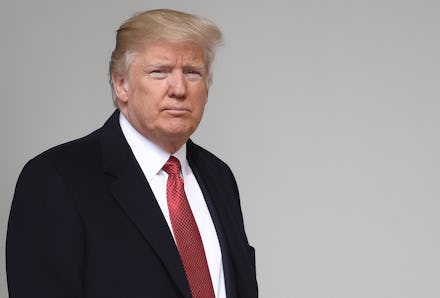A judge in Hawaii just blocked Donald Trump's updated Muslim ban

On Wednesday, a federal judge in Hawaii granted a motion for a temporary restraining order blocking President Donald Trump's revamped ban on travelers from six majority-Muslim countries.
The case in Hawaii was brought by a Honolulu imam named Ismail Elshikh, who said the ban prevents his mother-in-law from traveling to Hawaii from her native Syria to visit his family.
The ban was set to go into effect at 12:01 a.m. Eastern on Thursday. There were also legal challenges to the ban on Wednesday in both Washington state and Maryland.
In late January, Trump issued a sweeping travel ban that temporarily blocked individuals from seven majority-Muslim countries from entering the United States and indefinitely banned the U.S. from accepting any more refugees.
After considerable public outcry, a federal judge in Washington state halted the law, and later a three-judge panel upheld his decision, effectively blocking the ban. Instead of fighting that ruling, the White House issued a new updated travel ban that dropped Iraq from the list of banned countries and explicitly exempted visa holders and lawful permanent residents.
ACLU National Political Director Faiz Shakir said in a phone interview, "I think it's great news ... despite their best efforts at trying to put together a 'legal way' to do a Muslim ban, they are finding the only way to fix a Muslim ban is to not do a Muslim ban."
Senate Minority Leader Nancy Pelosi weighed in on Twitter, arguing the revised ban was motivated by the same "dangerous discrimination" as the prior order.
She was joined by popular Democratic Sen. Elizabeth Warren, who quipped "Turns out, an illegal Muslim ban by another name is still an illegal Muslim ban.:
While most administration staff chose to lay low on Wednesday evening, the president himself weighed in on the ruling at a rally in Nashville, Tennessee.
"But let me give you the bad news," the president said. "The bad, the sad news. Moments ago, I learned that a district judge in Hawaii, part of the much-overturned Ninth Circuit Court, and I have to be nice otherwise I'll get criticized for speaking poorly about our courts ... I'll be criticized by these people, among the most dishonest people in the world, I'll be criticized by them for speaking harshly about our courts."
"The order he blocked was a watered down version of the first order, that was also blocked by another judge, that should have never been blocked to start with," Trump continued. "This order was tailored to the dictates of the ... Ninth Circuit's flawed ruling ... I think we should go back to the first one."
Trump concluded the ruling was an "unprecedented judicial overreach."
Tom McKay and Celeste Katz contributed additional reporting to this article.
March 15, 2017, 8:53 p.m.: This article has been updated.